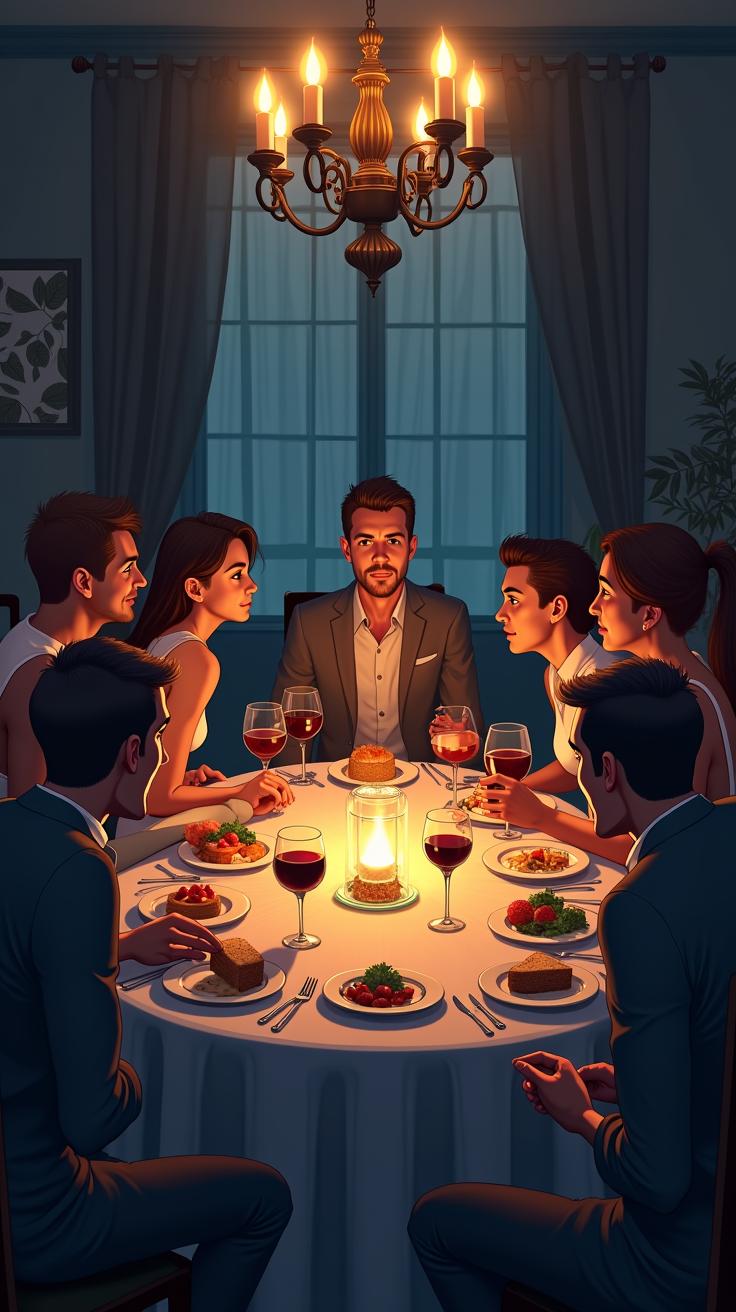AITA for yelling at my friends and leaving dinner after they all made fun of me and gave me a gay intervention?
 Image credit: Pixabay (This is example image – Not the actual photo)
Image credit: Pixabay (This is example image – Not the actual photo)
When Friendship Turns Into Assumptions
In a seemingly light-hearted dinner with friends, a young woman finds herself at the center of an unexpected and uncomfortable debate about her sexuality. Mistaken for a man by a waiter, her friends’ jokes quickly spiral into a misguided “intervention” about her supposed lesbianism, despite her clear denial. This story raises thought-provoking questions about identity, assumptions, and the boundaries of friendship, making it relatable to anyone who has faced misunderstandings about their personal life. Can you truly be yourself when your friends impose their narratives on you?
Family Drama and Misunderstandings: A Dinner Dispute
A 21-year-old woman (referred to as 21F) recently experienced a conflict during a dinner outing with five friends, which escalated into a significant misunderstanding about her identity. Here’s a breakdown of the situation:
- Setting: The group was dining at a fancy restaurant, enjoying each other’s company.
- Initial Incident: A waiter mistakenly identified 21F as a man. One of her friends jokingly responded, “Oh, she’s not a man, she’s just a lesbian,” prompting laughter from the table.
- Response: 21F was taken aback by the comment and questioned her friend about it, clarifying that she had never identified as a lesbian. She expressed surprise that her friends assumed her sexuality based on her appearance.
- Escalation: Instead of understanding her perspective, her friends continued to joke about her supposed sexuality, suggesting she was “hiding” it and making comments about her style. This included remarks about her past friendship with Ines, which had ended poorly.
- Emotional Reaction: 21F felt hurt and misunderstood, especially since she had confided in her friends about her feelings regarding Ines. She firmly stated that she was not a lesbian and found the jokes to be inappropriate.
- Intervention: As 21F insisted on her identity, her friends shifted from joking to lecturing her about self-acceptance and internalized homophobia, which she found absurd and unwarranted.
- Confrontation: Frustrated by the situation, 21F expressed her anger, accusing her friends of being unsupportive and leaving the restaurant in distress.
- Aftermath: The following morning, 21F felt regret about how the situation unfolded and was uncertain about how to approach her friends moving forward.
This incident highlights the complexities of family drama and the challenges of conflict resolution among friends. Misunderstandings about identity can lead to tension, especially in social settings like weddings or gatherings. 21F is now left contemplating her next steps in addressing the fallout from the dinner and repairing her friendships.
This is Original story from Reddit
 Image credit: Pixabay (This is example image – Not the actual photo)
Image credit: Pixabay (This is example image – Not the actual photo)
Story
I 21F went out to dinner with 5 friends, 1 guy, and 4 girls. For context, I look very masculine: short hair, deep voice, no makeup, masculine style, etc. Sometimes I get mistaken for a man. Usually, if it’s by someone I’m never gonna see again, i.e., a cashier or waiter, I don’t really care to correct them.
My friends and I were having dinner at a nice fancy place, and the waiter came to our table and mistook me for a man. One of my friends responded, “Oh, she’s not a man, she’s just a lesbian.” Everyone laughed, and the waiter apologized.
After he left, I asked my friend, “Why did you say that?” I have never said or indicated in any way that I’m a lesbian because I’m not. I’ve never had a boyfriend, but that’s because I’m not interested in a romantic relationship, though we have talked about male celebrities we find attractive.
I thought it was clear I was straight. My friend rolled her eyes at my question and said, “Oh c’mon, we all know you’re a lesbian.” I was shocked.
More friends jumped in and said, “Yeah, you don’t have to lie to us.” I wasn’t lying. They started making jokes about me “dressing like a lesbian,” “hiding my sexuality,” “being in a glass closet,” “everyone knows,” “it’s 2025, no one cares,” etc.
It all seemed like it wasn’t a joke, and they actually believed it. One of my friends, Eva, even joked, “You were obviously in love with Ines.” I showed genuine shock at this remark, and she reassured me, “It’s okay, we all don’t mind if you’re gay.”
Ines was an on-and-off childhood friend of mine, and our friendship ended badly a few months ago. I was very upset by it and confided in my friends. I never thought they would use it against me.
I told them firmly that I’m not a lesbian, this isn’t funny, and I was not in love with Ines. Once they saw I was being serious about this, their tone and attitude became less jokey.
They started lecturing me on self-acceptance, being in denial, internalized homophobia—I’m not homophobic—heteronormativity, compulsory heterosexuality, etc. It was like some sort of gay intervention. I found it absolutely ridiculous.
I yelled at them for being bad friends because I couldn’t even dress how I want or talk to them about my troubles, and I left the restaurant.
It’s the morning after, and I have serious regret. I don’t know what to say to them and what to do.
AITA?
View the Original Reddit Post Here
Summary of Reddit Comments
The top Reddit comments indicate a strong consensus that the original poster (OP) is not at fault (NTA) for their reaction to friends who dismissed their stated sexual orientation. Users emphasize that the friends’ refusal to listen and their assumptions based on appearance were not only disrespectful but also hypocritical, as they failed to recognize the complexities of identity. Many commenters suggest that true friends should accept and respect OP’s identity without imposing their own perceptions.
Verdict: NTA
Expert Advice for Resolving the Conflict
Resolving conflicts, especially those involving misunderstandings about identity, requires empathy, open communication, and a willingness to listen. Here are practical steps for both 21F and her friends to address the situation and move forward:
For 21F
- Reflect on Your Feelings: Take some time to process your emotions about the incident. Write down how you felt during the dinner and why the comments hurt you. This will help clarify your thoughts when you talk to your friends.
- Initiate a Calm Conversation: Reach out to your friends and suggest a time to talk. Choose a neutral setting where everyone feels comfortable. Approach the conversation with an open mind and express your feelings without placing blame.
- Clarify Your Identity: Clearly communicate your identity and feelings about the jokes made during dinner. Emphasize that your sexuality is not a punchline and that assumptions based on appearance can be harmful.
- Set Boundaries: Let your friends know what kind of jokes or comments are unacceptable to you. Setting clear boundaries is essential for maintaining healthy relationships.
- Be Open to Their Perspectives: While it’s important to express your feelings, also be willing to listen to your friends’ viewpoints. They may not have realized the impact of their words and could benefit from understanding your perspective.
For 21F’s Friends
- Listen Actively: When 21F reaches out to discuss the incident, make a conscious effort to listen without interrupting. Validate her feelings and acknowledge the hurt caused by the jokes.
- Acknowledge Mistakes: If you recognize that your comments were inappropriate or hurtful, take responsibility for them. Apologizing sincerely can go a long way in mending the relationship.
- Educate Yourselves: Take the time to learn about sexual orientation and identity. Understanding the complexities can help prevent similar misunderstandings in the future and foster a more supportive environment.
- Encourage Open Dialogue: Create a safe space for discussions about identity and feelings within your friend group. Encourage everyone to share their thoughts and experiences without fear of judgment.
- Support 21F: Show your support for 21F by respecting her identity and boundaries moving forward. Let her know that you value her friendship and are committed to being more understanding.
Moving Forward
Conflict resolution is a process that requires patience and understanding from both sides. By engaging in open and honest communication, 21F and her friends can rebuild their relationship and create a more supportive dynamic. Remember, true friendship is built on respect, acceptance, and the ability to learn from one another.
Join the Discussion
 Image credit: Pixabay (This is example image – Not the actual photo)
Image credit: Pixabay (This is example image – Not the actual photo)
What do you think? Would you have handled this differently?
Share your thoughts below! Vote: Do you agree with Reddit’s verdict?













